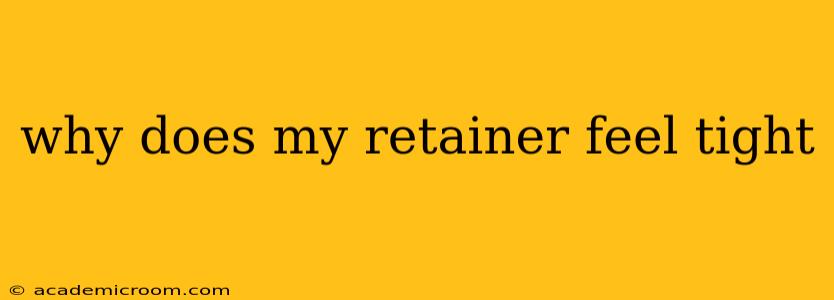Why Does My Retainer Feel Tight?
Feeling tightness with your retainer is a common experience, and usually nothing to worry about. However, understanding the reasons behind it can help manage discomfort and ensure your orthodontic treatment continues successfully. This tightness can stem from several factors, and addressing them properly is crucial for long-term oral health.
Is it Normal for a Retainer to Feel Tight?
Yes, some degree of tightness, especially immediately after fitting or after a period of removal, is perfectly normal. Your mouth needs time to adjust to the retainer's presence. Think of it like breaking in a new pair of shoes; they'll feel snug at first, but will become more comfortable over time. However, persistent or severe tightness warrants a visit to your orthodontist.
What Causes a Tight Retainer?
Several factors contribute to a tight-feeling retainer:
- Swelling: Immediately after having your braces removed or a new retainer fitted, your gums and tissues may be slightly swollen. This swelling can make the retainer feel tighter than it actually is. This typically subsides within a few days.
- Bone Shifting: While your braces corrected the position of your teeth, your jaw bone continues to adapt even after the braces come off. This minor bone shifting can cause your retainer to feel snugger. This is a natural process.
- Retainer Material: Different retainer materials react differently to changes in temperature and moisture levels in your mouth. This can slightly alter the fit.
- Incorrect Fitting: While less common with modern technology and techniques, a poorly fitted retainer can cause persistent tightness and discomfort. This is a reason to seek professional help.
- Tooth Movement: If the retainer feels significantly tighter after a period of wearing, there might be some slight tooth movement. This indicates the retainer isn't keeping the teeth in their corrected positions, and it's imperative to contact your orthodontist.
- Weight Gain/Loss: Significant fluctuations in body weight can subtly alter facial features and jaw structure, potentially affecting retainer fit.
How Long Does the Tight Feeling Last?
The duration of the tight feeling depends on the underlying cause. Minor swelling usually resolves within a few days. The adjustment period to a new retainer can take a week or two. However, if the tightness persists beyond two weeks or worsens, professional dental evaluation is necessary.
What Should I Do If My Retainer Feels Tight?
- Mild Discomfort: For mild, temporary tightness, try gently massaging your gums. Rinsing your mouth with warm salt water can also help reduce any swelling.
- Persistent Tightness: If the tightness persists, is accompanied by pain, or you experience difficulty speaking or eating, contact your orthodontist immediately. This could signify a problem requiring professional intervention. Don't try to adjust the retainer yourself, as this could cause further issues.
- Broken Retainer: If your retainer is broken or damaged, seek immediate attention from your orthodontist. Wearing a broken retainer can hinder treatment and potentially damage your teeth.
Can I Stretch My Retainer Myself?
Absolutely not. Attempting to stretch or adjust your retainer yourself can damage the appliance and potentially harm your teeth or gums. Always consult your orthodontist for any issues related to retainer fit or comfort.
When Should I See My Orthodontist?
Schedule an appointment with your orthodontist if:
- The tightness is severe or persistent.
- You experience pain or discomfort that doesn't subside.
- You notice any damage to the retainer.
- You have difficulty speaking or eating due to the retainer.
By understanding the reasons behind a tight-feeling retainer and taking appropriate action, you can ensure your teeth remain healthy and straight, maintaining the excellent results of your orthodontic treatment. Regular communication with your orthodontist is key to a successful outcome.
